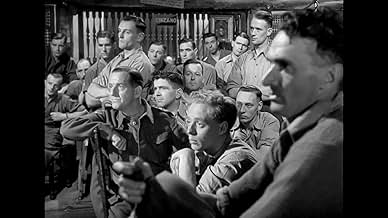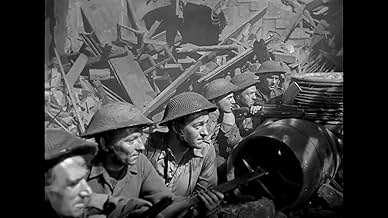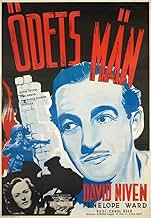VALUTAZIONE IMDb
6,9/10
2375
LA TUA VALUTAZIONE
Aggiungi una trama nella tua linguaWorld War II drama that follows a group of British draftees, starting with their rigorous basic training, and ending with their deployment in North Africa.World War II drama that follows a group of British draftees, starting with their rigorous basic training, and ending with their deployment in North Africa.World War II drama that follows a group of British draftees, starting with their rigorous basic training, and ending with their deployment in North Africa.
- Regia
- Sceneggiatura
- Star
- Premi
- 1 vittoria in totale
Hugh Burden
- Pte. Bill Parsons
- (as Hugh Burdon)
Jimmy Hanley
- Pte. Geoffrey Stainer
- (as Jimmie Hanley)
William Hartnell
- Sgt. Ned Fletcher
- (as Billy Hartnell)
A. Bromley Davenport
- Chelsea Pensioner
- (as Bromley Davenport)
Renée Asherson
- Marjorie Gillingham
- (as Renee Ascherson)
Recensioni in evidenza
A film that despite being made in 1944, avoids sterotyping British Characters. A story about a group of people, from various civilian jobs, who receive their call-up papers. It shows them progressing through their training and entering action in North Africa.
It's long but it's good. For a British film from 1944 the production values are amazingly high. Whole buildings -- real ones -- collapse. The special effects at sea are convincing. And what a cast!
Actually, the story itself is hardly new. A diverse group of men are drafted into the Duke of Glendons, go through a training camp periods, their transport is torpedoed, and they fight a small-scale defensive battle among the ruins of a village in North Africa. Writers Eric Ambler and Peter Ustinov have whipped it into entertaining shape.
None of the men is regular army except the tough sergeant who has eyes like a lizard but the heart of a Rogerian therapist. David Niven has risen from the ranks and is a lieutenant. The men themselves, with their winsome misapprehensions, are brought into a state of readiness by a combination of strict physical demands and compassion. The leaders are stern but fair. I won't bother describing the draftees because you can already guess their nature from a dozen other war movies -- the grumbler, the show-off, the snob, the Welshman, the earnest patriot.
If you didn't know that it was directed by Carol Reed, you'd still probably notice some unusual directorial touches. A sleepy backwater little town. An old man, half asleep, brushing the flies from his face. A dog sleeping in the street. And then the distant sound of motorcycles and bren carriers growing louder. And soon a stream of British vehicles lumbering loudly through the main street and stirring the dust, with the dog lazily moping away and a disheveled Peter Ustinov emerging from the Cafe Rispoli to stare sullenly at the pageant.
It may or may not sound promising in a synopsis but in fact it's pretty good.
Actually, the story itself is hardly new. A diverse group of men are drafted into the Duke of Glendons, go through a training camp periods, their transport is torpedoed, and they fight a small-scale defensive battle among the ruins of a village in North Africa. Writers Eric Ambler and Peter Ustinov have whipped it into entertaining shape.
None of the men is regular army except the tough sergeant who has eyes like a lizard but the heart of a Rogerian therapist. David Niven has risen from the ranks and is a lieutenant. The men themselves, with their winsome misapprehensions, are brought into a state of readiness by a combination of strict physical demands and compassion. The leaders are stern but fair. I won't bother describing the draftees because you can already guess their nature from a dozen other war movies -- the grumbler, the show-off, the snob, the Welshman, the earnest patriot.
If you didn't know that it was directed by Carol Reed, you'd still probably notice some unusual directorial touches. A sleepy backwater little town. An old man, half asleep, brushing the flies from his face. A dog sleeping in the street. And then the distant sound of motorcycles and bren carriers growing louder. And soon a stream of British vehicles lumbering loudly through the main street and stirring the dust, with the dog lazily moping away and a disheveled Peter Ustinov emerging from the Cafe Rispoli to stare sullenly at the pageant.
It may or may not sound promising in a synopsis but in fact it's pretty good.
The version of The Way Ahead that I have is one that was edited for the American market and has a narration by US war correspondent Quentin Reynolds. It was his narration that sets the stage for a wartime tribute to the civilians who volunteered for king and country at a time of their nation's greatest peril.
When war in Europe was declared David Niven was one of the British stars in America that went back to serve. Since he had been in the army before taking up acting, he was able to secure a commission. For a good deal of the war he was a training officer and really was drilling the men as we see on Salisbury plain. Some of his time was spent in the commandos in missions to Europe. And he was released to make wartime films Spitfire and The Way Ahead.
The script was written by a 21 year old actor/playwright named Peter Ustinov who has a small role in the film. According to a new biography of Niven in order to secure Ustinov's service, enlisted man Ustinov was attached to officer Niven as his orderly.
A whole lot of faces familiar in the British cinema appeared in The Way Ahead, people like Stanley Holloway, Jimmy Hanley, James Donald, Leo Genn, and Trevor Howard. And it was directed in good style by Carol Reed, one of his earliest films.
One big flaw in the film was that the men who trained with officer Niven and sergeant William Hartnell ended up serving with him in North Africa. Not possible in America and not possible in the UK either. But since the idea was to show camaraderie, I guess that Two Cities Films can be forgiven.
The point of the film and of Quentin Reynolds narration is that in time of peril it is the democracies and not those totalitarian countries with a superman philosophy who have the real strength of character. May it ever be so.
When war in Europe was declared David Niven was one of the British stars in America that went back to serve. Since he had been in the army before taking up acting, he was able to secure a commission. For a good deal of the war he was a training officer and really was drilling the men as we see on Salisbury plain. Some of his time was spent in the commandos in missions to Europe. And he was released to make wartime films Spitfire and The Way Ahead.
The script was written by a 21 year old actor/playwright named Peter Ustinov who has a small role in the film. According to a new biography of Niven in order to secure Ustinov's service, enlisted man Ustinov was attached to officer Niven as his orderly.
A whole lot of faces familiar in the British cinema appeared in The Way Ahead, people like Stanley Holloway, Jimmy Hanley, James Donald, Leo Genn, and Trevor Howard. And it was directed in good style by Carol Reed, one of his earliest films.
One big flaw in the film was that the men who trained with officer Niven and sergeant William Hartnell ended up serving with him in North Africa. Not possible in America and not possible in the UK either. But since the idea was to show camaraderie, I guess that Two Cities Films can be forgiven.
The point of the film and of Quentin Reynolds narration is that in time of peril it is the democracies and not those totalitarian countries with a superman philosophy who have the real strength of character. May it ever be so.
This is a film about a seemingly run of the mill sort of group. After the Brits were involved in WWII and saw how bad the going would be, the government was forced to draft men who would traditionally have been exempt. Men who were a bit old or involved with careers that might be deemed 'useful' to the effort were suddenly being called to duty, as times were dire. The beginning of the film shows these men being selected for service.
Unfortunately, this is a rather motley group and they tended to complain quite a bit as well (mostly by Stanley Holloway's character). How they could become a productive unit seemed pretty doubtful and I doubt if such an unimpressive group of men would have been used as actors had this propaganda film been made a few years earlier--when things looked really bad for the British. However, now that the war was appearing win-able, I can understand the choices of actors.
There is nothing particularly magical about any of the film--their selection, their training or their combat experience in North Africa. However, all of it was very well handled and excelled because they tried to make it believable--normal, everyday men rising to the occasion. In many ways, it reminded me of a landlocked version of "In Which We Serve"--with fine acting and writing instead of jingoism and super-human exploits. Very well done.
There are a few interesting actors in the film. Peter Ustinov is in his first film and he plays a French-speaking man. While his French isn't 100% fluid, it was decent and a bit of a surprise. Apparently, he was in real life David Niven's assistant in the British Army and somehow ended up in the film--and thus began his career. Also, Dr. Who fans will appreciate that the Sergeant is played by Dr. #1, William Hartnell.
By the way, this is a little explanation for those who are not British or familiar with British history. Early in the film, someone asks Stanley Holloway's character who he liked in Parliament. Holloway indicates the only one he liked was Guy Fawkes! Fawkes was part of a plot to blow up Parliament in 1605, but was caught and executed--and the Brits celebrate this to this day with Guy Fawkes Day--as day of merry-making, bonfires and fireworks! Obviously Holloway's character wasn't exactly fond of the government, eh?!
Unfortunately, this is a rather motley group and they tended to complain quite a bit as well (mostly by Stanley Holloway's character). How they could become a productive unit seemed pretty doubtful and I doubt if such an unimpressive group of men would have been used as actors had this propaganda film been made a few years earlier--when things looked really bad for the British. However, now that the war was appearing win-able, I can understand the choices of actors.
There is nothing particularly magical about any of the film--their selection, their training or their combat experience in North Africa. However, all of it was very well handled and excelled because they tried to make it believable--normal, everyday men rising to the occasion. In many ways, it reminded me of a landlocked version of "In Which We Serve"--with fine acting and writing instead of jingoism and super-human exploits. Very well done.
There are a few interesting actors in the film. Peter Ustinov is in his first film and he plays a French-speaking man. While his French isn't 100% fluid, it was decent and a bit of a surprise. Apparently, he was in real life David Niven's assistant in the British Army and somehow ended up in the film--and thus began his career. Also, Dr. Who fans will appreciate that the Sergeant is played by Dr. #1, William Hartnell.
By the way, this is a little explanation for those who are not British or familiar with British history. Early in the film, someone asks Stanley Holloway's character who he liked in Parliament. Holloway indicates the only one he liked was Guy Fawkes! Fawkes was part of a plot to blow up Parliament in 1605, but was caught and executed--and the Brits celebrate this to this day with Guy Fawkes Day--as day of merry-making, bonfires and fireworks! Obviously Holloway's character wasn't exactly fond of the government, eh?!
Although it may appear simplistic to divide the work of great artists into three distinct periods, there can be no escaping the fact that this tidy and convenient way of classification actually works for the majority. In the case of the most significant British director of the immediate post World War II years, Carol Reed, the chronological view works surprisingly well. There is the fairly anonymous early period up to "The Way Ahead" of 1944, a glorious middle period from "Odd Man Out" to "Outcast of the Islands" - the subsequent "The Man Between" and "A Kid for Two Farthings", although less successful, belong to this period because of their stylistic affinity - and a third period where Reed reverted to anonymity possibly through the pressures of commercialism - how else to explain works as dull as "The Agony and the Ecstasy" and "The Running Man", which do not even look like Reed films. Certainly none of the other films in the first period compare with the sheer enjoyment and confidence of "The Way Ahead". Here the youngish director flexes his muscles, a little parochially perhaps, before taking centre stage with the great directors of that time, De Sica, Rossellini, Welles and Wyler. Technically the film is astonishingly assured. Every shot is lovingly composed with figures always formally balanced within each frame. The editing is nothing short of brilliant. It is only in retrospect and with the advantage of several showings that one realises that the excitement and immediacy of a scene such as the torpedoing of the troopship are entirely achieved by the skill of montage. In every sense "The Way Ahead" is immeasurably superior to the Lean/Coward naval counterpart "In Which We Serve" which parades class distinctions in a way that is positively nauseous. There is nothing patronising in Reed's presentation of a group of men drawn together by the accident of war. Although they come from different social backgrounds, Reed presents them as conditioned by their varied forms of employment rather than being pigeonholed by class. "The Way Ahead" is that very unusual thing, a completely upbeat war film. I suppose it had to be, given its date - 1944. With the scent of victory about to be achieved it had to be an optimistic morale booster. However it goes very much further than any other I know in presenting a completely sanitised war. Not a single character is killed let alone wounded - and this even after the ship carrying the bulk of the cast is blown to smithereens just seconds after the captain leaves. The film ends with the men attaching bayonets to rifles before marching forward into a desert attack. By now we are conditioned into thinking they will all survive although we will never have a way of really knowing. Not that it matters at this stage. So sit back, relax and enjoy as lovely a war as you are ever likely to experience.
Lo sapevi?
- QuizIn the U.K., this was released on D-Day, June 6, 1944.
- BlooperFollowing some energetic army training, Private Bill Parsons is seen sitting on the grass at the top of a cliff, with his colleagues, exhausted. However, the action then cuts to him being helped up the cliff.
- Citazioni
Pvt. Ted Brewer: Only one good man ever got into Parliament.
Pvt. Herbert Davenport: Oh really? Who?
Pvt. Ted Brewer: Bleedin' Guy Fawkes.
- Curiosità sui creditiThe film ends with THE BEGINNING
- Versioni alternativeThe version seen on American TV under the alternate title "The Immortal Battalion" has been re-edited and extensively cut (from 115 to 91 or 86 minutes) by Ed Fitz with an added preface and epilogue by war correspondent Quentin Reynolds.
- ConnessioniEdited into WW II Theater: The Way Ahead (2022)
- Colonne sonoreIf You Were the Only Girl (in the World)
(uncredited)
Written by Nat Ayer
Lyrics by Clifford Grey
Performed by Tessie O'Shea and soldiers
I più visti
Accedi per valutare e creare un elenco di titoli salvati per ottenere consigli personalizzati
- How long is The Way Ahead?Powered by Alexa
Dettagli
- Tempo di esecuzione
- 1h 55min(115 min)
- Colore
- Proporzioni
- 1.37 : 1
Contribuisci a questa pagina
Suggerisci una modifica o aggiungi i contenuti mancanti



































